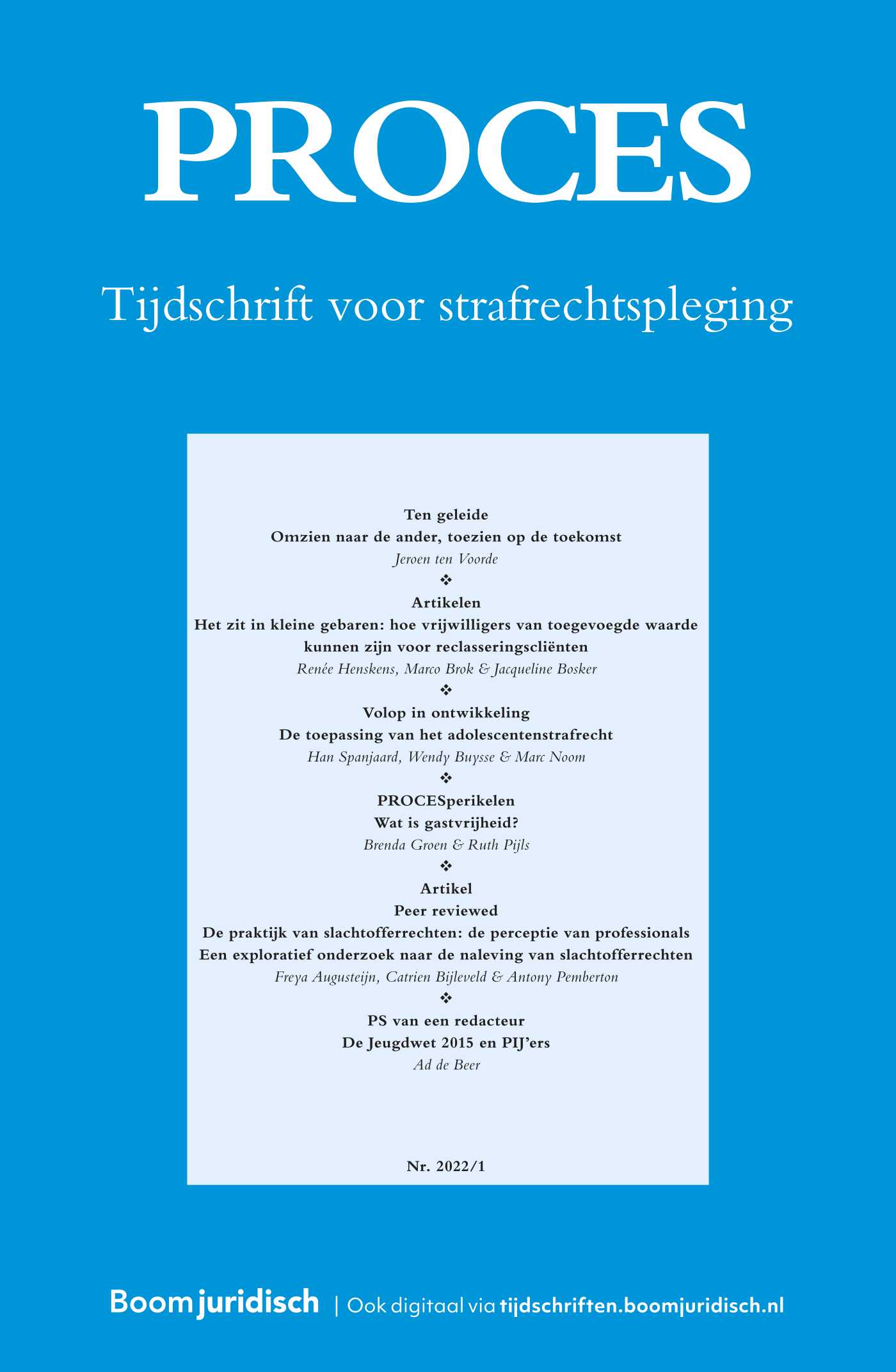|
While studies on trust in the police are numerous, this is much less the case for other policing actors. It is important to examine this in the light of the increasing number and diversification of policing actors and their legitimacy. Using a survey, 894 youngsters were asked to evaluate their trust in actors involved in the policing of urban nightlife areas: the police, door staff, and CCTV. Results showed that people tend to trust human actors of surveillance more compared to technological actors, however different (demographic and contextual) factors nuance this pattern. |


PROCES
Meer op het gebied van Criminologie en veiligheid
Over dit tijdschriftMeld u zich hier aan voor de attendering op dit tijdschrift zodat u direct een mail ontvangt als er een nieuw digitaal nummer is verschenen en u de artikelen online kunt lezen.
| Ten geleide |
Waarom het Wetsvoorstel straffen en beschermen zijn doel voorbijschiet |
| Auteurs | Mr. dr. Sigrid Van Wingerden |
| Auteursinformatie |
| Artikel |
|
| Trefwoorden | vertrouwen, Toezicht, plural policing, Legitimiteit |
| Auteurs | Dr. Janne van Doorn en Dr. Jelle Brands |
| SamenvattingAuteursinformatie |
| Artikel |
Het punitieve karakter van de Educatieve Maatregel Gedrag en verkeer (EMG)Een analyse aan de hand van het begrip criminal charge ex artikel 6 lid 1 EVRM |
| Trefwoorden | EMG, Huftercursus, Snelheidscursus, Vorderingsprocedure |
| Auteurs | Victor Huurman |
| SamenvattingAuteursinformatie |
|
This contribution deals with the punitive aspects of the Dutch ‘Educational Measure Behaviour and traffic’ rehabilitation course (EMG), thereby using the criminal charge concept (article 6 ECHR) and the alcohol interlock case law as indicators for the level of punitivity. As of 2009, Dutch drivers whom (repeatedly) commit traffic violations may be subjected to an EMG. Failing this course can cause a driver to have his or her driving licence suspended. The Dutch Driving Test Organization (CBR) lacks the possibility to take any individual circumstances into account. The question then arises as to whether the EMG may have a disproportionate impact in certain cases. It is argued that the imposition of the EMG predominantly qualifies as a criminal charge, requiring an extension of the current regime of legal protection. It is furthermore argued that the dominant position of the police officer who makes an EMG report should be reconsidered. |
| Artikel |
Gesloten jeugdinrichtingen in Nederland en België: anders maar hetzelfde?Een rechtsvergelijkend onderzoek naar de rechtspositie in gesloten jeugdinrichtingen in Nederland en België vanuit historisch en internationaal perspectief |
| Trefwoorden | Gesloten jeugdinrichting, Interne rechtspositie, Jeugdzorgplus, Gemeenschapsinstelling, Justitiële jeugdinrichting |
| Auteurs | Mr. Charmaine Purperhart |
| SamenvattingAuteursinformatie |
|
A comparative legal research between Dutch and Belgian closed juvenile detention centres, focused on the internal legal status |
| PROCESperikelen |
Een tatoeërende politieman |
| Auteurs | Mark Westerlaken |
| Auteursinformatie |
| Artikel |
Achter de schermen bij een pro justitia onderzoek in Teylingereind: de toegevoegde waarde van klinische observatie bij moeilijk onderzoekbare jeugdigen |
| Trefwoorden | Jeugdstrafrecht, Forensische psychiatrie en psychologie, Rapportage pro Justitia, Klinische observatie, Weigeraars |
| Auteurs | Mr. Merijne Groeneweg en Mr. Harmen van den Dorpel |
| SamenvattingAuteursinformatie |
|
This article merely outlines the methods of Teylingereind with respect to youth and young adult suspects who are difficult to examine, based on five cases. By collecting and combining data about this group from a range of different perspectives, better insight about the specific person was obtained in each of the cases as described. When it is possible to describe specific behavioural patterns, statements could be made about freedom of behavioural choices, danger of recidivism, and advice about the most appropriate legal framework. In this way, when there are serious concerns about the developmental course of youth and young adults who are not willing to cooperate in diagnostic research pro Justitia, clinical observation is of added value to the judge. |
| Artikel |
Een Europees Openbaar Ministerie: kansen en risico’s |
| Trefwoorden | Europees Openbaar Ministerie (EOM), Europese Unie (EU), Forumshoppen, Telefoontappen |
| Auteurs | Mr. Tom Huisjes |
| SamenvattingAuteursinformatie |
|
By the end of 2020, the European Public Prosecutor’s Office (EPPO) will be operational. The EPPO will be tasked with investigating, prosecuting and bringing to judgement criminal offences against the EU budget. The substantive competence of the EPPO could in the future be extended to terrorism and other serious cross-border crimes. This article will first describe the background, structure and competences of the future EPPO. Then the procedural guarantees will be discussed and the problem of ‘forum shopping for evidence’. This problem entails that the choice in which Member State to conduct an investigative measure could be made on the basis of the less stringent rules in that Member State regarding, for example, the right to privacy. The article will end with a proposal on how to prevent forum shopping for evidence. |
| PS van een redacteur |
‘Is criminaliteit een keuze?’Een prikkelende stelling tijdens het Crimefest |
| Auteurs | Mr. Coosje Peterse |
| Auteursinformatie |

